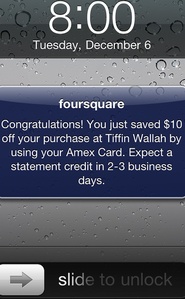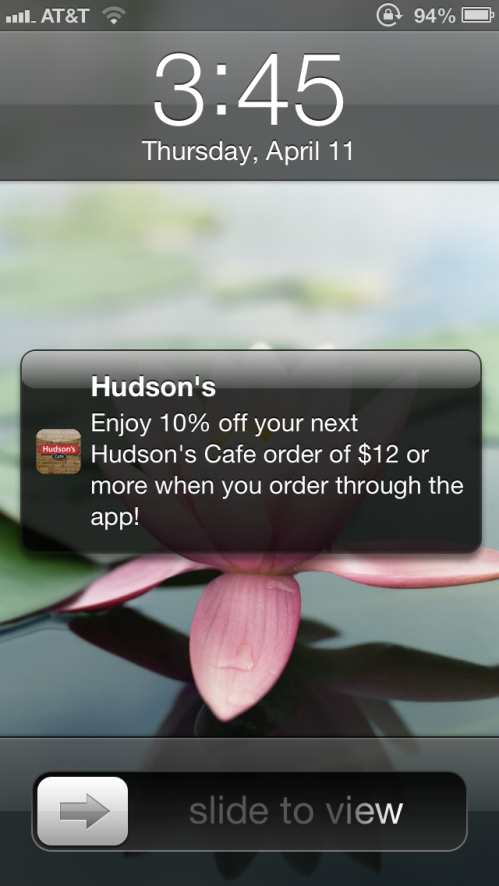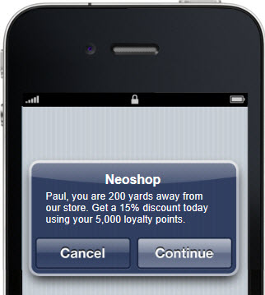The modern consumer desires a truly personalized experience, with timely, relevant messages delivered to them through their preferred channels, placing the power in their hands. The proliferation of smartphones and the explosion of app usage have created a phenomenal opportunity for marketers to adopt and implement personalized push notification messaging strategies.
Mobile apps and push notifications can have significant implications on sales, as research shows 29% of U.S. consumers have made purchases from mobile devices, and Bank of America data shows there will be $67.1 billion in revenue from smartphone and tablet retail purchasing by European and U.S. shoppers in 2015. So, the time has arrived to deliver truly personalized messages to mobile devices in an effort to increase sales.
Let’s take a look at four different use cases for personalized push notifications, as each offers a unique opportunity to reach consumers in real-time through their mobile devices.
Event-Triggered Messaging
Through mobile application usage, marketers have the ability to really learn about their customers and connect with them on a personal level. Mobile app user events, such as birthdays, upcoming expiration dates (product release, deals, promotions, or other events potentially selected in a preference center), and shopping cart abandonment can all play into the marketers’ hand. Wishing a customer a happy birthday through their mobile device or simply sending a reminder about expiring services will show you care on a more personal level.
Cart abandonment remarketing messages specifically can serve as one of the most financially beneficial event-triggered notifications sent to customers. Research shows 56% of abandoned carts were done so because the consumer wasn’t ready to purchase at that moment in time, but wanted to save the cart for later. While cart abandonment messages have traditionally been sent via email, push notifications are a great way to reinvent this classic remarketing technique and offer another touch point. Marketers can send push notifications to individuals that have “abandoned” shopping carts as a reminder, and redirect them to an in-app page where they can complete their order in seconds.
Transactional Messaging
Examples of transactional messages include order confirmations, shipping and delivery notifications, welcome emails, and password rest links. Smart marketers not only include the pertinent transaction information (e.g. order details), but also provide product recommendations based on what similar consumers have purchased or other relevant offers.
According to Epsilon’s Q3 2011 North America Email Trends and Benchmarks Results report, transactional email messages generate an average open rate of 42 percent, highest among all message types, and an average click-through rate of 8.9 percent, second only to editorial emails.
Like event-triggered messages, transactional messaging strategies can be supplemented with mobile push notifications. For instance, a brand could send a order confirmation notification that re-directs customers to an in-app page where they can review order details and receive recommendations on what other people bought.
Promotional Marketing
Offering deals and promotions to consumers is one of the most basic forms of marketing. Thanks to mobile apps and personalized in 1:1 pushes, marketers now have the opportunity to bring these promotional messages to the next level. For example, an online purchaser could show trends of specific behavioral habits. By leveraging this information, the marketer could push a promotional message with special offers or bargains specific to their preferred (as identified through online behavior tracking or a preference center) product category.
Marketers don’t need to worry about being invasive with these messages, as research shows 43% of smartphone owners are open to receiving in-app promotional messages at least once a week, and an additional 11% once a month. By studying customer’s online behavior and preferences, marketers can offer promotional messages that will pique their interest with hopes in converting a sale.
Geo-Location
Building further on promotional offers based on customer behavior and preferences, mobile now arms marketers with the opportunity to use physical location as a parameter to trigger messages. With the help of geo-location services, Foursquare or Facebook check-ins, marketers can set a perimeter around a location, that when entered, will trigger a message to the mobile user in that area. In the image below, a message has been sent to a user based on their proximity to a brick-and-mortar store, and includes their loyalty points balance as well.
Nearly half (47%) of mobile consumers want retailers to send these messages, including coupons and promotions, when they are in or near a brick-and-mortar store. This provides marketers the opportunity to deliver messages that will potentially drive sales to willing mobile device users that are in the right place at the right time. Such techniques could help brick-and-mortar retailers combat the “showrooming” trend.
Final Thoughts
Mixing mobile marketing efforts with social data can create the perfect personalization potion for marketers. Event triggered, transactional, promotional, and geo-targeted messages are four great opportunities for marketers to use push notifications to capitalize on mobile device users’ willingness to interact with brands that take the time to personalize messages. So don’t miss out on the chance to connect with on-the-go customers on a personal level.
Take a look at our mobile marketing solution to learn more about mobile push notifications or to get your brand involved as many of our customers have done. Also, feel free to leave a comment to let us know how your brand connects with consumers through mobile!



